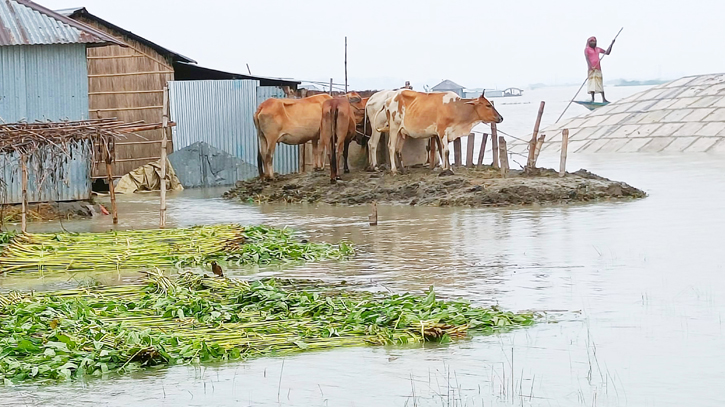
Photo : Messenger
The current floods in Sirajganj have submerged various crop fields, resulting in an agricultural loss of Tk 63 crore. Consequently, 37,000 farmers in the district have been adversely affected due to waterlogged agrarian land.
The water levels in the Jamuna River and other rivers in the district rose in early July due to the seasonal monsoon and mountain runoff from upstream. For 11 days, the water levels exceeded the danger mark.
Approximately Tk 63 crore worth of crops have been damaged, putting many farmers in financial distress. The agricultural department has stated that they will compile a list of affected farmers and provide assistance.
According to the District Agricultural Extension Office, on Monday, July 29, the ongoing floods in Kazipur, Belkuchi, Sadar, Chauhali, and Shahjadpur upazilas of Sirajganj have affected 37,046 farmers. For the past 22 days, 6,525 hectares of crops in the district have been submerged. Of this, 3,185.1 hectares have been completely destroyed. The estimated loss of these crops amounts to Tk 627.8 million.
Suruj Ali, a farmer from Tekani village in Kazipur upazila, stated that he had cultivated potol on 3 bighas of land. All the crops were destroyed by the floodwaters, resulting in a loss of Tk 20,000. He is now worried about how to support his family.
Altap Sheikh, a farmer from Barni village in Kawakola Union of Sadar upazila, said that he had cultivated sweet gourd, beans, and pumpkin on 2 bighas of land, and jute on another 2 bighas. While the jute was not significantly damaged, the gourd and pumpkin plants rotted away. This caused him a loss of around Tk 35,000.
Motaleb Sheikh, a farmer from Brahman village in Chauhali upazila, mentioned that he had cultivated eggplant on 2 bighas and gourd on 1 bigha of land. All of these crops were destroyed by the floodwaters. He is now deeply concerned about how to manage his household expenses.
Ranajit Kumar Sarkar, Sub-Divisional Engineer of the Sirajganj Water Development Board, said that the water levels of the Jamuna River exceeded the danger mark for 11 days. The water levels have been receding for the past week and a half, and there is currently no risk of further rise.
Babul Kumar Sutradhar, Deputy Director of the District Agricultural Extension Department, reported that in the ongoing floods, 6,525 hectares of crops, including jute, sesame, Aus, Aman seedbeds, and vegetables in the char and lowland areas, have been submerged. Of this, 3,185 hectares have been completely destroyed. A list of affected farmers has been compiled, and the matter has been reported to higher authorities. They have also mentioned providing assistance to the farmers. If the assistance is provided, it will benefit the farmers to some extent.
The district administration, recognizing the severity of the situation, is mobilizing efforts to provide relief to the affected farmers. Local NGOs and community organizations are also stepping in to offer support. The agricultural sector is a lifeline for these communities, and the prolonged inundation poses a significant threat to their livelihoods. Immediate intervention is crucial to prevent further economic distress. The government’s prompt response in approving financial aid and implementing restoration projects will be vital in aiding recovery.
Messenger/Fameema








